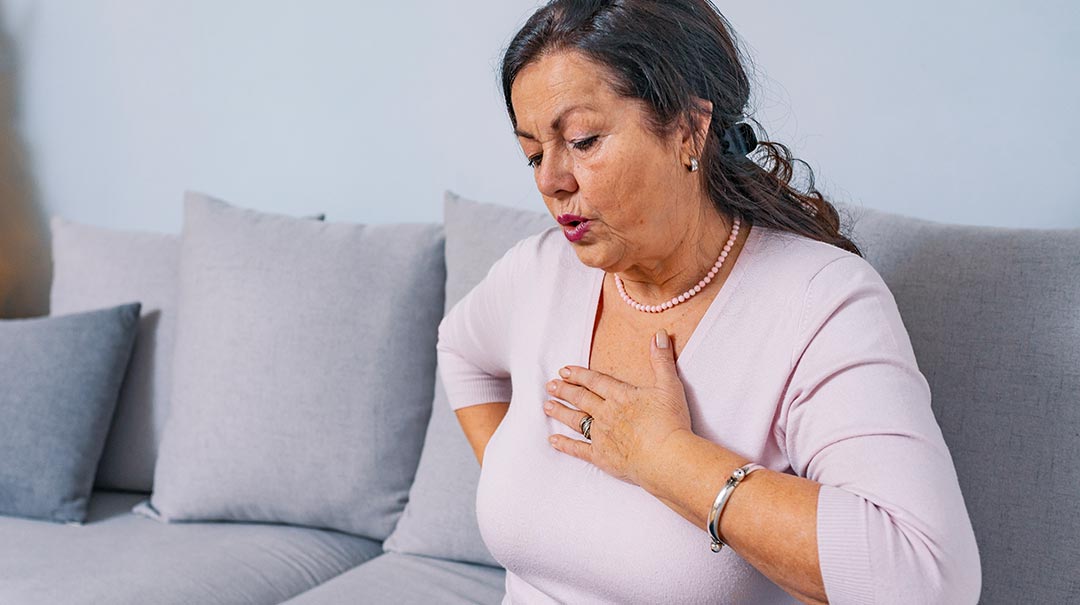Find care now
If you are experiencing a medical emergency, please call 911 or seek care at an emergency room.

There are a number of symptoms that might be warning signs of a heart attack—from radiating chest pain to something as subtle as dizziness or lightheadedness. The symptoms can even vary from men to women, too.
Women often have heart attack symptoms that are different from men’s symptoms, and women often overlook these symptoms because they don’t want to overreact. A patient can be experiencing alarming upper belly pain, but they don’t want to call an ambulance, go to the emergency room, and then find out their pain was only indigestion.
Don’t ignore your body. Know what signs of a heart attack women should watch for and whether you’re at risk for a heart attack so you can get help fast if you need it.
Related reading: Why do more women than men die after heart attacks?
What Signs Should I Watch for?
Women are more likely to have a silent heart attack, or one that doesn’t show any apparent symptoms. They’re also more likely to die after their first heart attack because they don’t want to overreact to symptoms. Women rarely feel the classic crushing pain in the chest that appears for men who have heart attacks. Instead, women’s symptoms often are more subtle and may include:
- Chest discomfort or fullness
- Blackouts or fainting
- Breathlessness during activities or waking up breathless at night
- Chronic fatigue after routine activities
- Dizziness that can indicate irregular heartbeats, or arrhythmias
- Swelling, particularly of the lower legs and ankles
- Palpitations, rapid heartbeats that may cause pain or difficulty breathing
- Nausea or vomiting, unrelated to diet, indigestion, or abdominal pain
- Sweating
Some patients say they feel an impending sense of doom. They feel as if they will die if they don’t seek help.
In women with diabetes, the symptoms are a bit different. They can experience chest pain when they’re going down the stairs to laundry or going up the stairs to put their kids to bed. If the pain creeps up on you and then gradually dissipates, this usually is an indication of coronary artery disease. You most likely have a blockage in a blood vessel that supplies blood to the heart that needs to be taken care of.
Patients also can feel pain in the middle of their chest that travels to their back. Some people even have chest pain on their right side, away from the heart. If your symptoms aren’t going away and they’re alarming you, don’t take the chance. Call 9-1-1 and take that ambulance ride.
Heart Attack Risk Factors for Women
It’s even more important to seek medical help for possible symptoms of a heart attack if you have risk factors for heart disease, such as:
- A family history of heart disease
- Diabetes
- High blood pressure (hypertension)
- High cholesterol (hypercholesterolemia)
Diabetes can lead to serious cardiovascular issues, particularly in women. A woman’s risk for heart disease increases after menopause because estrogen levels decline. Before menopause, estrogen can protect against some of the problems related to high cholesterol, a common factor in heart disease.
Lifestyle choices such as smoking, an unhealthy diet, and not exercising can lead to heart disease. Women should have their blood pressure, cholesterol, glucose, and body mass index checked by their doctor. Monitoring those numbers can help you stay healthy. They should also learn about their family history and discuss all these issues with a doctor.
We know that coronary artery disease can manifest suddenly and become a heart attack. Women should take these symptoms seriously and not take the chance. They should seek medical help. It’s better to be safe than sorry.














